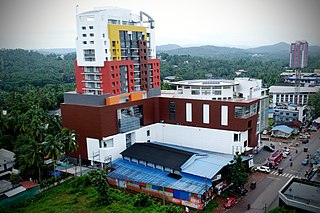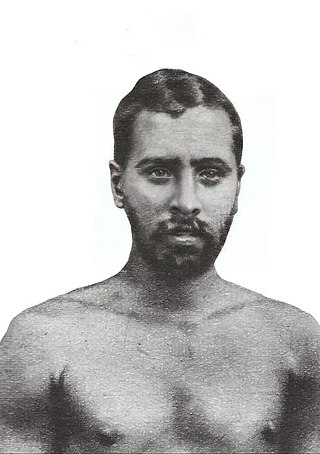
Malappuram, is one of the 14 districts in the Indian state of Kerala, with a coastline of 70 km (43 mi). The most populous district of Kerala, Malappuram is home to around 13% of the total population of the state. The district was formed on 16 June 1969, spanning an area of about 3,554 km2 (1,372 sq mi). It is the third-largest district of Kerala by area. It is bounded by Western Ghats and the Arabian Sea on either side. The district is divided into seven Taluks: Eranad, Kondotty, Nilambur, Perinthalmanna, Ponnani, Tirur, and Tirurangadi.
The Khilafat movement (1919–22) was a political campaign launched by Indian Muslims in British India over British policy against Turkey and the planned dismemberment of the Ottoman Empire after World War I by Allied forces.

Manjeri is a major town and municipality in Malappuram district, Kerala, India. It is the fourth-most populous municipality in state. It is situated 23 kilometres (14 mi) southeast of Karipur International Airport and 13 kilometres (8.1 mi) northeast of Malappuram, the district headquarters, and forms a part of Malappuram metropolitan area. It is one of the major commercial towns under the Malappuram urban agglomeration and serves as the headquarters of Eranad Taluk. Manjeri Municipality is a Local Self Government Institution with a jurisdiction of three villages namely Manjeri, Payyanad, and Narukara.

Ponnani is a municipality in Ponnani Taluk, Malappuram District, in the state of Kerala, India. It serves as the administrative center of the Taluk and Block Panchayat of the same name. It is situated at the estuary of Bharatappuzha, on its southern bank, and is bounded by the Arabian Sea on the west and a series of brackish lagoons in the south.

Malabar District, also known as British Malabar or simply Malabar was an administrative district on the southwestern Malabar Coast of Bombay Presidency (1792–1800), Madras Presidency (1800–1937), Madras Province (1937–1950) and finally, Madras State (1950–1956) in India. It was the most populous and the third-largest district in the erstwhile Madras State. The historic town of Kozhikode was the administrative headquarters of this district.
Mappila songs are a folklore Muslim song genre rendered to lyrics, within a melodic framework (Ishal), in Arabi Malayalam by the Mappilas of the Malabar region in Kerala, India. Mappila songs have a distinct cultural identity, while at the same time remain closely linked to the cultural practices of Kerala.
E. Moidu Moulavi (1886–1995) was an Indian National Congress (INC) leader,Islamic scholar, one of the Salafi movements reformers, scholar and educationist of Malabar District, born at Maranchery in Ponnani. He was a supporter of the Islahi movement in Kerala and a co-worker with leaders like K. M. Maulavi, Sayyid Sanaulla Makti Thangal, Mohammed Abdul Rahiman and K. M. Seethi Sahib

Thavanur is a village on the southern bank of the Bharathapuzha, the longest river of Kerala in the Malappuram District of Kerala state in India. This village is located at the border of Tirur and Ponnani Taluks. The Bharathappuzha River separates Thavanur from Tirunavaya and Kuttippuram towns in Tirur Taluk.

K. N. Panikkar is an Indian Marxist historian, associated with the Marxist school of historiography.
Freedom Fighters & Rehabilitation Division, a division of the Ministry of Home Affairs of India, manages the Swathantra Sainik Samman Pension Scheme - a national pension scheme introduced in 1972 for Freedom Fighters and their dependents. The division also handles rehabilitation assistance for refugees and migrants from Pakistan, Sri Lanka and Tibet. However, there was significant resistance to implementing the scheme. For example, it took 24 years of legal fighting for S. M. Shanmugam to finally receive his pension in August 2006.
Nellikuth is a town in Manjeri Municipality in Malappuram district of Kerala, India. It is situated 8 km west to Manjeri and 16 km north west to the Malappuram, the district headquarters. It is one of the major place in Payyanad Village, in Eranad Taluk.

Chakkiparamban Variyankunnath Kunjahammad Haji sometimes called Variyamkunnan was a prominent leader during the war in Malabar against the British, during the Malabar rebellion, and the founder of a parallel government. He was an Indian freedom fighter, opposer of the Jenmi system, and an ordinary member of the Khilafat movement.

The Malabar rebellion of 1921 started as a resistance against the British colonial rule in certain places in the southern part of old Malabar district of present-day Kerala. The popular uprising was also against the prevailing feudal system controlled by elite Hindus.

Eranad also known as Ernad refers to the erstwhile province in the midland area of Malabar, consisting of Malappuram and nearby regions such as Anakkayam, Manjeri, Kondotty, Nilambur, etc. Currently Eranad Taluk is a Taluk in Malappuram district. Eranad was ruled by a Samanthan Nair clan known as Eradis, similar to the Vellodis of neighbouring Valluvanad and Nedungadis of Nedunganad. The rulers of Eranad were known by the title Eralppad/Eradi. They also used the title Thirumulpad.

The Nilgiri Malabar Battalion (NMB) was an Auxiliary Force (India) of the British Colonial Auxiliary Forces of the British Indian Army, composed of Eurasians/Anglo-Indians. Enrollment in the Auxiliary Force was open to all European British subjects and to persons of European descent. After the Mutiny of 1857, a Volunteer Force was created, whose primary function was to protect British families in India. The Volunteer Force units were later absorbed into the Auxiliary Force India, which was created in 1920 for internal security duties. Its terms of service were similar to the Territorial Army of the UK. The Auxiliary Force India, which provided officers to the Army during World War II, was disbanded in 1947.
Malappuram is one of the 14 districts in the South Indian state of Kerala. The district has a unique and eventful history starting from pre-historic times. During the early medieval period, the district was the home to two of the four major kingdoms that ruled Kerala. Perumpadappu was the original hometown of the Kingdom of Cochin, which is also known as Perumbadappu Swaroopam, and Nediyiruppu was the original hometown of the Zamorin of Calicut, which is also known as Nediyiruppu Swaroopam. Besides, the original headquarters of the Palakkad Rajas were also at Athavanad in the district.
Musliyar is an honorific associated with South Indian, chiefly Malayali, scholars of Islam. Notable people with the surname include:

Kaathib Thayyil Mohammed Kutty Musliyar, popularly known as K. M. Moulavi or K. M. Maulavi, was an Indian religious Leader. He was a leader of the Muslim League and Islahi Movement from Malabar district. He was a religious scholar who promoted modern education, the Malayalam language, and Muslim women's education. He worked to uplift the Mappila community after the Malabar rebellion.

The Battle of Pookkottur was a battle that the Mappilas of Malabar fought against the British army during anti-colonial struggles in Malabar province of Northern Kerala, India. The battle took place on 26 August 1921 at Pookkottur in Malappuram district. Indian forces were led by Vadakkuveettil Mohammed, the Secretary of the Khilafat Committee in the Malabar region. He led the force of Variyankunnath Kunjahammad Haji, while Cuthbert Buxton Lancaster and Captain P. McEnroy led the British force. The Battle played an important role in Malabar rebellion.

The Tirurangadi Taluk Office, also known as Hajur Kacheri, is a historic building located in Tirurangadi Talk of Malappuram District in the Indian state of Kerala. It houses the Tirurangadi Taluk Office since the post-independence Malabar District or British-era Madras Presidency. The Taluk office, which was once the Hajur Kacheri (Huzur Office) under the British, was one of the major administrative centers of the British government in Malabar region. The building also functioned as the headquarters of a short-lived Khilafat government during the rebellion.











